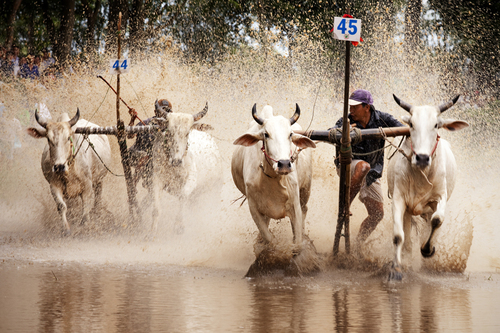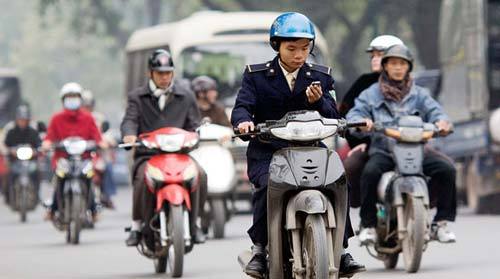Below is an excerpt from my book, East Eats West: Writing in Two Hemispheres, published in 2010. Vietnam is on a course for credit upgrade and its economy is growing. For many this leads to new found wealth and status, and, inevitably, a lot of stress.
At an ultra-chic bar called Nam Kha, a well-dressed woman in her mid-twenties named Tram tells me that she's "si-tret." She speaks Vietnamese but switches to English for a word heard often here. There is no equivalent word in her language. The closest you can get is cang thang than kinh--tension of the mind.
Stress is probably the biggest trend to hit Vietnam from America since MTV. At first glance it seems impossible: Vietnam, after all, is a country full of hardworking young people, and rural life is backbreaking for the majority. Generation after generation has known nothing but sweat and toil. But stress is a phenomenon not of simple hard work. It is a kind of symptom associated with young, upwardly mobile urban professionals in peacetime.
One is "si-tret," therefore, like Huy Phan, thirty-two, an ad executive for Tien Phong publishing company, an association of lifestyle magazines. This evening at the Nam Kha bar he has lost his voice after talking nonstop for four hours with clients, models, and photographers on his expensive cell phone. "It's always like this," Huy complains. "It's my day off, but I never stop working. I'm terribly si-tret."
Vietnam's upwardly mobile urban young are given to multitasking these days. Next to Huy, Tram is talking on one phone, ordering a drink, conversing with another friend, and, yes, text messaging on another cell phone--all at once. "I have a headache almost every night," Tram complains. "I never had this kind of headache until I got my new job." Her new job: overseeing dozens of young saleswomen in a cosmetic company.
Huy and Tram are quick to acknowledge that they are a privileged group with opportunities unavailable to previous generations in communist Vietnam. Just a generation ago more or less everyone had to stand in line to buy rice, and moving from city to city was a prohibitively complex task that required navigating Vietnam's heavy bureaucracy. These days, young twenty- and thirty-somethings like Huy vacation regularly in Thailand and Singapore. Huy has traveled twice to the United States. Tram flies to Thailand every few months to "de-si-tret" herself. How? "I go shopping," she laughs.
The owner of Nam Kha, on the other hand, says he's not si-tret. Duc Phan, thirty-two, one of three partners who own a growing conglomerate of silk stores, restaurants, and resorts in Vietnam, is gentle and calm. He tells me his secret. "I have very good managers," he says, smiling and patting the shoulder of a handsome young man standing next to him. "They si-tret on my behalf."

Photo by Robert Dodge, collected in his new book of photography: Vietnam 40 Years Later.
Vietnam is a heated economy, in Asia second only to China in terms of growth. Tourism, too, is increasing. Bob Bannerman, who works for the U.S. consulate in Ho Chi Minh City, says that he sees a shift toward more economic and political transparency here in the last few years. "More and more foreigners are coming in to invest," says Bannerman. "Vietnam wants to be taken seriously now, and there are many smart young people doing amazing things here."
But success comes with a price. The newspapers are full of stories of young people who commit crimes of greed. A story that ran recently in Tuoi Tre, a youth newspaper, is a case in point. A young man seduced a teenage girl, and when his cell phone business went belly up he murdered her and took all of her expensive belongings in order to pay back his debtors.
Bao Nguyen, twenty-eight, a flight attendant who also owns a cosmetic store, says he must constantly purchase new, expensive toys to fit in with his business circle. "I bought a five-hundred-dollar cell phone, and everyone in my circle has one. So I bought a new one for twelve hundred dollars, and now I'm respected. It's materialistic, but in my business, you have to do it." And yes, he is often si-tret. But "to de-si-tret," Bao says, "I go to spas and get pampered. It's popular now, even among men."
In a report by the Pew Center a few years ago, of forty-four countries surveyed, Vietnam was the most optimistic. A whopping 98 percent of Vietnamese said they expect their children to be better off.

Photo by Robert Dodge, collected in his new book of photography: Vietnam 40 Years Later.
"Vietnamese are experiencing stress now because life is no longer routine," says Michael, an American businessman who declined to give his full name and who has lived in Vietnam for three years. "Or rather, new routines must be learned, and learned quickly in a society that's going through enormous transition."
Yet as someone who speaks fluent Vietnamese, I cannot help but detect a hidden bragging tone within the familiar complaints of the upwardly mobile here. When a Vietnamese says he is si-tret, he is also saying, "I'm doing something important, and I'm successful, and this is the price I'm willing to pay for it."
Huy, meanwhile, is buying everyone at the counter a drink. "I just made a big sale. Come on, drink up," he says hoarsely, just as his cell phone starts to ring again.
Related articles:
Vietnam is Poised for a Revolution, One Text Message at a Time
Vietnam 40 Years Later
Andrew Lam is an editor with New America Media and author of the "Perfume Dreams: Reflections on the Vietnamese Diaspora," and "East Eats West: Writing in Two Hemispheres." His latest book is "Birds of Paradise Lost," a short story collection, was published in 2013 and won a Pen/Josephine Miles Literary Award in 2014.

